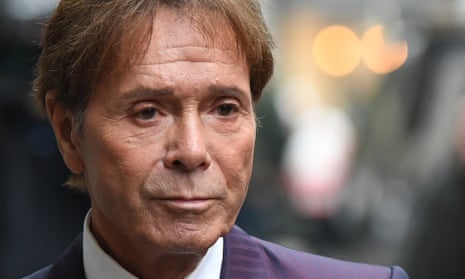BBC coverage of the police raid on Sir Cliff Richard’s home in 2014 – filmed from a helicopter hovering overhead – was accurate and a “matter of legitimate public interest”, its lawyers have told the high court.
The high-profile dispute over privacy and the boundaries of press freedom revolves around how the corporation reported the investigation into a historical sexual assault claim against the 77-year-old singer.
Richard has always denied wrongdoing and has never been charged with any offence. His compensation claim has been brought on the basis that the news reports violated his privacy and breached the 1998 Data Protection Act.
The case sets privacy rights under article 8 of the European convention on human rights against freedom of expression rights under article 10. The corporation believes that if it loses, a far-reaching precedent will be set that will restrict journalistic freedom of expression.
Richard is claiming £279,261 for legal fees and £108,500 for his public relations expenses.
Gavin Millar QC, representing the BBC, said: “[Richard] challenges the right of a news media organisation to report that he was the subject of a police investigation and that a judicial warrant to search his property had been executed.
“The allegation being investigated was one of a serious criminal offence. Information that enabled the BBC to report these matters had been provided to it by the investigating police force knowing that it would be used by the BBC to report in this way.
“[Richard’s] challenge is framed in privacy and data protection. In addition, [he] complains that the reporting damaged his reputation. It is the first time such a claim has been brought to court in this country.”
The BBC’s reporting of the search, Millar said, “was accurate and in good faith, was on a matter of legitimate public interest, and respected the rights of [Richard] as a suspect, in particular the presumption of innocence.” It had recorded the singer’s “full denial of the allegations at every stage”.
In written arguments, Millar told the judge, Mr Justice Mann, that parliament had never legislated to prevent reporting of the execution of search warrants. That reflects a general consensus that reporting on such matters is in the public interest.
“No doubt the reporting had an impact on [Richard] … but this has to be separated out from the distress he experienced, and would have experienced, in any event as a result of being the subject of such an allegation, investigation and search. It does not provide a sufficiently weighty claim for infringement of privacy to prevail over the public interest in the BBC’s reporting.”
Earlier, opening the hearing, Justin Rushbrooke QC, who represents Richard, said his client was “one of the most distinguished entertainers this country has ever known”. He had sold more than 250m records and recorded more than 100 albums. No one other than the Beatles or Elvis Presley had sold more singles, the court was told. Yet Richard was subjected to a privacy invasion “of a kind no citizen of this country should ever have to experience”, Rushbrooke said.
“No citizen should have to watch film footage broadcast on national and international television of police searching their home shot from a helicopter hovering just overhead,” he said. “No citizen should have to learn from their friends that they are a person under investigation for a historic sex offence involving a child.”
What happened was a “media circus”, he said. Internal BBC documents described it as a “monster story” and Rushbrooke agreed that it was indeed disproportionate in its intrusiveness. The impact of the coverage was to shatter Richard’s life, and his “reputation around the world was left in shreds”, he said.
The coverage was all about the BBC’s obsessive hunt for a media scoop rather than reporting the news, the court was told.
Richard also sued South Yorkshire police, . who agreed to pay him £400,000 after settling the claim he brought against the force, the court was told.
“The accusation against [Richard] was entirely false,” Rushbrooke said. “No criminal charges were ever brought against him. It was a bad day for Sir Cliff, but it was also a bad day for public service broadcasting.
Richard had brought the claim, the court was told, so that what happened to him would not happen to anyone else again”.
The court heard that Fran Unsworth, a senior BBC editor, took the decision to send up a helicopter to capture video footage through the windows of police officers carrying out that search. The BBC said they could not run the story without having television pictures.
Rushbrooke said the information about the police investigation into Richard came from a “tainted source” within the police Operation Yewtree.
Only the BBC chose to name Richard initially, the court was told, after the police declined to say who was the subject of the investigation. “The lawyers should have been all over the story because it was clearly flagged as important and sensitive,” Rushbrooke said.
BBC and ITV news broadcasts from the day of the raid on the mansion, in Sunningdale, Berkshire, were shown to the court. Richard’s lawyers said the singer was entitled to very substantial compensation because the BBC coverage was a flagrant breach of his privacy rights.
The hearing continues.
